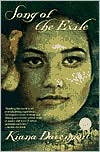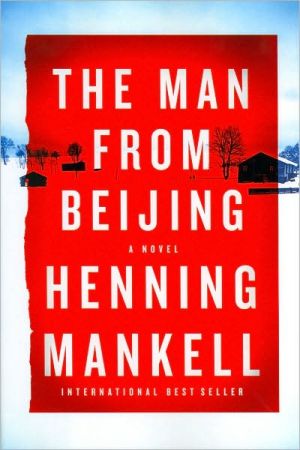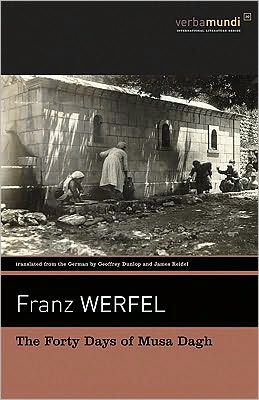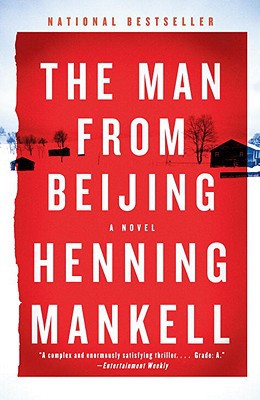Song of the Exile
In this epic, original novel in which Hawaii's fierce, sweeping past springs to life, Kiana Davenport, author of the acclaimed Shark Dialogues, draws upon the remarkable stories of her people to create a timeless, passionate tale of love and survival, tragedy and triumph, survival and transcendence. In spellbinding, sensual prose, Song of the Exile follows the fortunes of the Meahuna family--and the odyssey of one resilient man searching for his soul mate after she is torn from his side by...
Search in google:
In this epic, original novel in which Hawaii's fierce, sweeping past springs to life, Kiana Davenport, author of the acclaimed Shark Dialogues, draws upon the remarkable stories of her people to create a timeless, passionate tale of love and survival, tragedy and triumph, survival and transcendence. In spellbinding, sensual prose, Song of the Exile follows the fortunes of the Meahuna family--and the odyssey of one resilient man searching for his soul mate after she is torn from his side by the forces of war. From the turbulent years of World War II through Hawaii's complex journey to statehood, this mesmerizing story presents a cast of richly imagined characters who rise up magnificent and forceful, redeemed by the spiritual power and the awesome beauty of their islands.Tony GibbsSong of the Exile is a tragic love story whose protagonists are torn apart by World War II, but Davenport has woven a number of themes into her big, powerful tale, from the horrors of modern war to the universality of music (in this case, jazz) as a crosscultural language. Song of the Exile is a tale for readers who love big, colorful, emotive stories. Sometimes spectacle, sometime nightmare, sometimes tearjerker, its a book you won't forget. &#;151 Island Magazine
RABAUL NEW BRITAIN, 1942 \ "... SOON THE 'IWA BIRD WILL FLY. HUGE MAMMAL WAVES WILL breach and boom. It will be Makahiki time. Autumn in my islands ..."\ She sits up quickly in the dark, taking her body by surprise. Her fingers roam her face, a face once nearly flawless. She drags her knuckles down her cheeks.\ Outside, electrified barbed wire hums. She feels such wrenching thirst, she sucks sweat coursing down her arm. Then carefully she rises, gliding like algae through humid air. She listens for the sea. For that is what she longs for--waves cataracting, corroding her to crystals. From somewhere, gurgling latrines. Even their sound is comforting.\ A kerosene lamp is steered into the dark. Sunny watches as dreamily it floats, comes down. A soldier's hand, the hand of memory, places it on the floor, revealing a yeasty, torn mosquito net. Inside, a young girl on a narrow bed, so still she could be dead.\ In watchtowers surrounding the women's compound--twenty Quonset huts, within each, forty women--guards yawn and stroke their rifles. One of them half dozes, dreamily composing an impeccable letter to his family in Osaka. "Mother, we are winning.... The Imperial Japanese Army will prevail!" He is growing thin.\ In one hut a young girl, Kim, pulls her net aside. Burning with pain, she crawls into Sunny's narrow bed, into her arms, and sobs.\ Sunny calms her, whispering, "Yes, cry a little, it will help you sleep."\ "It's hardest when the sky turns light. I think of my family who I will never see again. I want to run outside, throw myself against the fence." Sunny sighs, breathes in the smell of sewage, failing flesh. "Kim, be strong. Think of music, think of books--normal things we took for granted."\ "I don't remember normal things." Kim scratches at her sordid legs, a girl of sixteen. "I don't remember life.\ " Sunny shakes her gently, feeling mostly bone. "Listen now. When the whistle blows for mustering, we'll stand up straight, eat whatever scraps they throw. No matter how filthy the water, we'll drink. With what is left we'll bathe. We'll do this for our bodies, so our bodies will know we still have hope for a future."\ "What future?" Kim whispers. "Two years of this. I only want to die."\ "Hush, and listen. Death would be too easy, don't you see?" Sunny sighs, begins to drift. "... In Paris now it would be cool. We would stroll the boulevards." Her voice turns dreamy. "We might even take a cab."\ Kim looks up, asking softly, "Will the drivers be rude again?"\ "Oh, yes. And my French is so bad. Maybe this night we would go to Chez L'Ami Louis."\ "Oh! The food is rich, so excellent." Kim momentarily comes alive, for this is her favorite game. Imagining.\ "What wine shall we order? The house Fleurie?"\ "And paté. And oysters! Will you dip mine in horseradish, Sunny?"\ "Of course. And I will scold you when you pocket the matches, such a tourist thing."\ Her voice softens. She thinks of Keo, their time in Paris. Rocking in lush geometries of morning light, nothing between them but heartbeats. Then spinning under marble arches, through terraced parks, young and careless and exiled. Not seeing Paris collapsing around them, not seeing their lives were crumbling.\ "How happy we were. Grabbing each moment, so alive."\ "I have no such memories," Kim weeps. "I never shall."\ "Of course you will! One day this will end. You will heal. Life will help you to forget."\ "... Yes. Maybe life is waiting in Paris. Beauty and adventure. And shall we walk this evening down the Champs Elysées? Shop for the softest kid gloves? And cologne? Or maybe take a café and wait for Keo. I'll close my eyes, pretend I'm there, just looking on."\ "Shh," Sunny whispers. "Soon it will be daylight. If they find us together, they'll beat us again."\ She feels tears come: hunger, torture, incessant pain, the knowledge that she and this girl--all of them--are dying.\ "Don't think so much. It will consume you. You will never survive."\ "Survive. For what?" Kim's voice grows loud; girls sit up listening behind their nets. "You talk of life. How can we face life after this? How can we face ourselves?"\ Sunny's voice turns urgent. "We must live. Or what have we suffered for? Will these years have been for nothing?\ " Under her pillow is a makeshift map, drawn so she can remember where they are, where they were shipped to months ago. Here is the town of Rabaul on the island of New Britain, east of Papua New Guinea, just north of Australia. Here is the Pacific Ocean and, far to the northeast, Hawai'i. Honolulu, home. Farther out is the world, the great oceans. Far across the Atlantic, there is Paris. Yesterday. But, always, her mind snaps back to Rabaul.\ Exhausted, weak beyond knowing, Kim sinks back on the filthy mattress, stale grains of rice matting her hair. "I want to sleep, I want to dream. Oh, take me back to Paris, shops, cabarets. Tell me again how you and Keo rode in a car with the top down....\ " Paris, Sunny thinks. We were so innocent. Not understanding trains were already leaving stations, streets were darkening with blood. She sighs, begins again, dreamily, and as she talks, girls struggle from their beds, move down the aisle, brushing her mosquito net. Some so thin, their movements seem delicate, some so young they are children, ghosts weaving through a scrim. Wanting only to listen and dream, they sit with arms entwined, heads bowed against each other.
\ From Barnes & NobleThe Barnes & Noble Review\ War creates many exiles in the heartbreaking new novel by Kiana Davenport, the critically acclaimed author of the multigenerational saga of Hawaiian history, geography, and culture Shark Dialogues. Davenport again sets her book in Hawaii, then follows a diverse and captivating cast of characters across the globe through events determined by World War II and its aftermath. From Honolulu to New Orleans, Paris to New Britain, Shanghai to Kowloon, Song of the Exile features rich locations as varied and ultimately as haunted as its characters. Each of the central characters — the brilliant jazz musician Keo and the flawlessly beautiful love of his life, Sunny; the reluctant but brave soldier Krash and his own defiantly self-possessed lover, Malia — struggles to come to terms with the impositions of both war and colonization: a loss of entitlement, of free will, of dignity. The concept of "exile" takes on several meanings, however, with hunger for belonging and for community weighed against hunger for bodily sustenance and for sanity in the most harrowing moments captured here. In Davenport's rich tapestry of myth and history, of the political and domestic spheres, of brutal desire and rare moments of exquisite joy, the final song played is, if not entirely triumphant, then at last and completely transcendent. \ The most cruelly exiled characters in this image-laden novel are the women enslaved by the Japanese in their rampage across the Pacific. Davenport's project is openly political. Sunny, daughter of the Hawaiian native, Butterfly, and the Koreandoctor,Samchock Sung, represents a composite character of all the "comfort women" that Japanese soldiers brutalized during the war. Raped as many as 80 times a day, most of these women were murdered when losing the war became inevitable. In the feminist tradition of reclaiming stories lost to a largely male-authored history handed down in textbooks and documentaries, war records, and even novels, Davenport brings to light the nearly indescribable horror these women suffered. She's done her homework well. In driving prose that conveys to the last detail the nightmare existence thrust upon these women, Davenport never loses track of the ways subjugation bonds victims together while also causing them to turn on each other.\ In interviews, Davenport reports that some of the women who survived this sexual enslavement live on today in anonymity, still frightened of showing their faces — even to a listener as sympathetic as Davenport. To these women she dedicates Song of the Exile. Their story remains at its heart, making the difference between this novel and a number of other recent works addressing World War II.\ War creates strange lovers and renders home a dream never within reach. Those are the constant themes Song of the Exile shares with the recent American release of Penelope Fitzgerald's Human Voices. Set in London during the air raids and loosely based on Fitzgerald's own experiences working for the BBC, Human Voices chronicles the mystery and intimacy of the desperation and pluck of people under siege. A love affair also ignites the events of the recent Oprah-backed bestseller set in Nazi Germany, The Reader, by German author Bernhard Schlink. Charlotte Gray, by Sebastian Faulks, maps romantic devotion and moral anguish in a story that opens in London with a dramatic rescue of a downed pilot and culminates in Vichy France.\ Of these books, Song of the Exile. is unique because it addresses a truly new arena of the war. Against the backdrop of Sunny's capture, we follow Keo from his early days learning piano and trumpet in Hawaii to his wandering through Louisiana with his fellow jazzmen, most of whom are African American. Racism and ostracism dog Keo's every move, even into Paris, where the Nazis love him for his soulful sound by night and hate him for his Hawaiian skin by day. But Keo is no one's patsy. Despite his small stature, he fights back, maintaining an unbowed spirit through internment in a concentration camp and, after the war, letting it fuel his desperate love for Sunny long after her disappearance.\ Powered by a strong investment in the unvoiced experiences of Asian women subjugated by the Japanese and the Hawaiians who gave themselves to their country unquestionably, Kiana Davenport makes literary history in Song of the Exile. To absorb this lyricism of this book is also to learn the pidgin language of Hawaii's people and to fall in love with the beautiful land and traditions that make their islands sacred.\ —Elizabeth Haas\ \ \ \ \ \ Tony GibbsSong of the Exile is a tragic love story whose protagonists are torn apart by World War II, but Davenport has woven a number of themes into her big, powerful tale, from the horrors of modern war to the universality of music (in this case, jazz) as a crosscultural language. Song of the Exile is a tale for readers who love big, colorful, emotive stories. Sometimes spectacle, sometime nightmare, sometimes tearjerker, its a book you won't forget. \ &#;151 Island Magazine\ \ \ Publishers Weekly\ - Publisher's Weekly\ The devastating effect of WWII on two Hawaiian families pervades this haunting novel that spans three continents and decades. Davenport (Shark Dialogues) traces the stories of Sun-ja Uanoe Sung (Sunny), a Hawaiian/Korean student from an educated family, and Keo, a native jazz musician, who meet and fall in love in Honolulu in the mid-1930s. When Keo (sometimes known as Hula Man) gets a chance to travel with a jazz band, he leaves Sunny for New Orleans and Paris. His reputation as a genius hornblower blossoms as quickly as racist violence darkens Nazi-infested Europe. Sunny escapes her fractured family life in Honolulu and journeys to join Keo in the City of Light. She revolts against the Nazi brutality she finds there, worrying also about the fate of her clubfooted sister, Lili, who was cast out by their father before Sunny was born. Arriving in Shanghai to look for Lili, Sunny is kidnapped and held captive as a "P-girl," servicing Japanese soldiers. Sunny is selected by one officer for proprietary use; her harrowing plight and that of thousands of other women and girls (some prepubescent) are described in searingly graphic detail. After the war, these women (who've aged several decades for every year of captivity) are too traumatized and ashamed to aid the Allies' feeble attempts at prosecution. There seems to be no real recovery from this level of atrocity, and Keo's story cannot equal Sunny's in intensity. After the war, Keo continues to search for Sunny, mourning and playing music. While the novel's nonsequential structure feels disjointed early on, it gains focus and power as Sunny's story unfolds. In the political maneuvering for Hawaii's statehood in 1959, the two families, bearing their emotional and physical scars, find some form of healing. Davenport's prose can verge on the purple, especially when describing Keo's musical artistry, yet overall she tells a powerful tale of love and loss. (Aug.) FYI: Davenport grew up in Honolulu, the daughter of a native Hawaiian whose ancestors were Tahitians, and a U.S. sailor from Alabama. Copyright 1999 Cahners Business Information.\ \ \ \ \ Library JournalHawaiian-born Davenport's new novel continues the forceful and lush yet unromanticized depiction of her native islands that characterized her debut, Shark Dialogues (LJ 4/1/94). Though Davenport reintroduces Pono, the kahuna or seer who dominated Shark Dialogues, star-crossed lovers Keo and Sunny are the heart of Song of the Exile. Keo, a talented jazz musician, leaves home and family to pursue his musical obsession. Sunny follows him to Paris, but the horrors of World War II separate them. Sunny eventually suffers the fate that thousands of women endured as "comfort women," or forced prostitutes for Japanese soldiers. Davenport's scope broadens to cover Keo's family, the Meahunas, but the suffering, tragedy, and survival of these lovers remain the haunting, mesmerizing centerpiece. This should join other Hawaiian fiction on library shelves, including Nora Okja Keller's Comfort Woman (LJ 1/97) and Sylvia Watanabe's Talking to the Dead (LJ 8/92). Recommended.--Faye A. Chadwell, Univ. of Oregon Libs., Eugene Copyright 1999 Cahners Business Information.\ \ \ \ \ Mindy PennybackerThere's good stuff here: ambitious characters, class and racial tensions building beneath the somnolence of Honolulu on the brink of war. \ &151#; The Nation.\ \ \ \ \ Kirkus ReviewsAn engaging love story dissipates long before this chronicle of a native Hawaiian family's melancholy experiences comes to a minor-key conclusion with statehood in 1953. Davenport (Shark Dialogues, 1994, etc.) introduces us to Keo and Sunny, young lovers, in Hawaii during the late 1930s. After hearing a visiting jazz group, Keo is entranced by the music's energy and emotion and vows to master it. Dew, the group's leader, tells him he must come to New Orleans or Paris someday, and Keo vows to take Sunny with him in pursuit of his fortunes. Initially unable to travel, she finally reunites with Keo in 1940 in Paris. As the Nazis march into the city, pregnant Sunny flees to rescue her lost sister in Shanghai. Feeling guilty for having let her go alone, Keo follows and finds Sunny and his newborn daughter before he's imprisoned in Shanghai. Sunny's sister and daughter die, then Sunny spends the remainder of the war in Rabaul, where she's forced to serve as one of hundreds of thousands of comfort women—girls, really, some as young as ten—for Japanese soldiers. Released from prison, Keo returns to Hawaii, picks up his jazz music, and, while touring through postwar Asia, continues his unsuccessful hunt for Sunny. His heartache grows, his music declines, and the plot fans out to encompass several additional characters, including Endo, a former Japanese soldier who once saved Keo's life in Paris but who also participated in the abuse of Sunny on Rabaul. The tale ends with statehood affirming cultural pride but also bringing the expectation of further exploitation. Davenport has a clarity of vision that makes her descriptions of Hawaii a match for the island's lush environment, thoughher attempts to vary the themes of her core story add just complicated overgrowth.\ \








